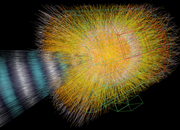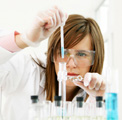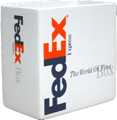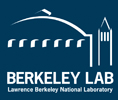


After months of colliding protons at world-record energies, the Large Hadron Collider has begun smashing particles more than 200 times as massive: the nuclei of lead atoms. Berkeley Lab hosts U.S. participation in ALICE, the LHC experiment designed specifically to study these heavy-ion collisions and the resulting quark-gluon plasma, a unique state of matter that existed millionths of a second after the big bang. The phenomenon of jet quenching in this hot, dense state was discovered only after ALICE was already under construction, and Berkeley Lab scientists and engineers led development of ALICE’s EMCal component to study it. Berkeley Lab plays a major role in ATLAS as well, which will also study the quark-gluon plasma. More>
 Nigel Quinn and Tryg Lundquist, of the Earth Sciences Division, have co-authored a report for the Energy Biosciences Institute in which they show that algae biofuel production will require much more long-term research, development, and demonstration before it becomes cost-competitive with other transportation fuels. In the meantime, several non-fuel applications could serve to advance the nascent algae industry. Their conclusions stem from a detailed techno-economic analysis of algal biofuels production. More>
Nigel Quinn and Tryg Lundquist, of the Earth Sciences Division, have co-authored a report for the Energy Biosciences Institute in which they show that algae biofuel production will require much more long-term research, development, and demonstration before it becomes cost-competitive with other transportation fuels. In the meantime, several non-fuel applications could serve to advance the nascent algae industry. Their conclusions stem from a detailed techno-economic analysis of algal biofuels production. More>
 [New York Times] In the Republican platform, Pledge to America, the party vows to cut discretionary nonmilitary spending to 2008 levels. Under that plan, research and development at nonmilitary agencies — including those that sponsor science and health research — would fall 12.3 percent, to $57.8 billion, from Mr. Obama’s request of $65.9 billion for fiscal year 2011. An analysis by the American Association for the Advancement of Science looked at what would happen if all of the agencies were cut to the 2008 amounts. More>
[New York Times] In the Republican platform, Pledge to America, the party vows to cut discretionary nonmilitary spending to 2008 levels. Under that plan, research and development at nonmilitary agencies — including those that sponsor science and health research — would fall 12.3 percent, to $57.8 billion, from Mr. Obama’s request of $65.9 billion for fiscal year 2011. An analysis by the American Association for the Advancement of Science looked at what would happen if all of the agencies were cut to the 2008 amounts. More>
 People: Earth Scientists Receive Membership Invitation, Award
People: Earth Scientists Receive Membership Invitation, Award The Earth Sciences Division’s Hoi-Ying Holman (pictured) has been invited to become a member of the Exemplar-Zero Initiative core advisory council. Formed by the Intergovernmental Renewable Energy Organization and Humanitad, the E-Z initiative’s main purpose is to promote United Nations Millennium Development Goals, which include eradicating poverty and hunger, improving maternal health, and empowering women, among other. More> Also, Marcelo Lippman recently received the Joseph Aidlin Award from the Geothermal Resources Council. He was honored for his outstanding contributions to the organization and the development of geothermal resources. More>
 Facilities: Only 'Point & Ship' Can be Used for FedEx, UPS, DHL
Facilities: Only 'Point & Ship' Can be Used for FedEx, UPS, DHL In July, FedEx.com and paper airbills were replaced with Point and Ship, the Lab's new online shipping system for FedEx, UPS and DHL. All old FedEx accounts are being closed and paper airbills will no longer be valid. Point and Ship is the only way people are allowed to ship. To ship anything (including FedEx, UPS and DHL envelopes), employees and guests must go through online training at shipping.lbl.gov. Access will be granted after completion. Vendors/collaborators can be set up to use Point and Ship on the Lab's account for Lab business. This replaces using the closed “Lab for FedEx” account numbers. For questions, contact [email protected] or x5084.
To help improve safety at the NERSC Oakland Scientific Facility computer room, the 88-Inch Cyclotron and the Advanced Light Source, all access points with card readers in those locations will be linked to the training database. Employees who need to enter these areas must have current site-specific training or access will be denied. The training requirements are OSF0360 (for NERSC computer room access), NSD439 (for the 88-Inch Cyclotron) and ALS1001 and ALS1008 (for the ALS). The safety coordinator for each location will provide site-specific communications regarding schedule and other implementation plans.
 SHARES 2010: Annual Giving Campaign Continues Until Nov. 24
SHARES 2010: Annual Giving Campaign Continues Until Nov. 24 For the 13th year, Berkeley Lab is sponsoring its charitable giving campaign called SHARES (Science for Health, Assistance, Resources, Education, and Services). Employees can contribute online or download a form to pay via check, or payroll deduction. For check or payroll deduction, mail the completed to Building 90G-117. The SHARES campaign ends Wednesday, Nov. 24.
 Public Affairs: Free Berkeley Lab Peel-Off Decals Available
Public Affairs: Free Berkeley Lab Peel-Off Decals Available The Public Affairs office has created a Berkeley Lab decal for use in car and building windows. The decal adheres to glass, but can easily be removed and reapplied. Employees can pick up a free decal in Building 65 during work hours. Limit two per person.
Today
at Berkeley Lab encourages feedback and story ideas
Deadline for submissions is 10 a.m. two days prior to publication
TABL is produced by Public Affairs' Communications Group